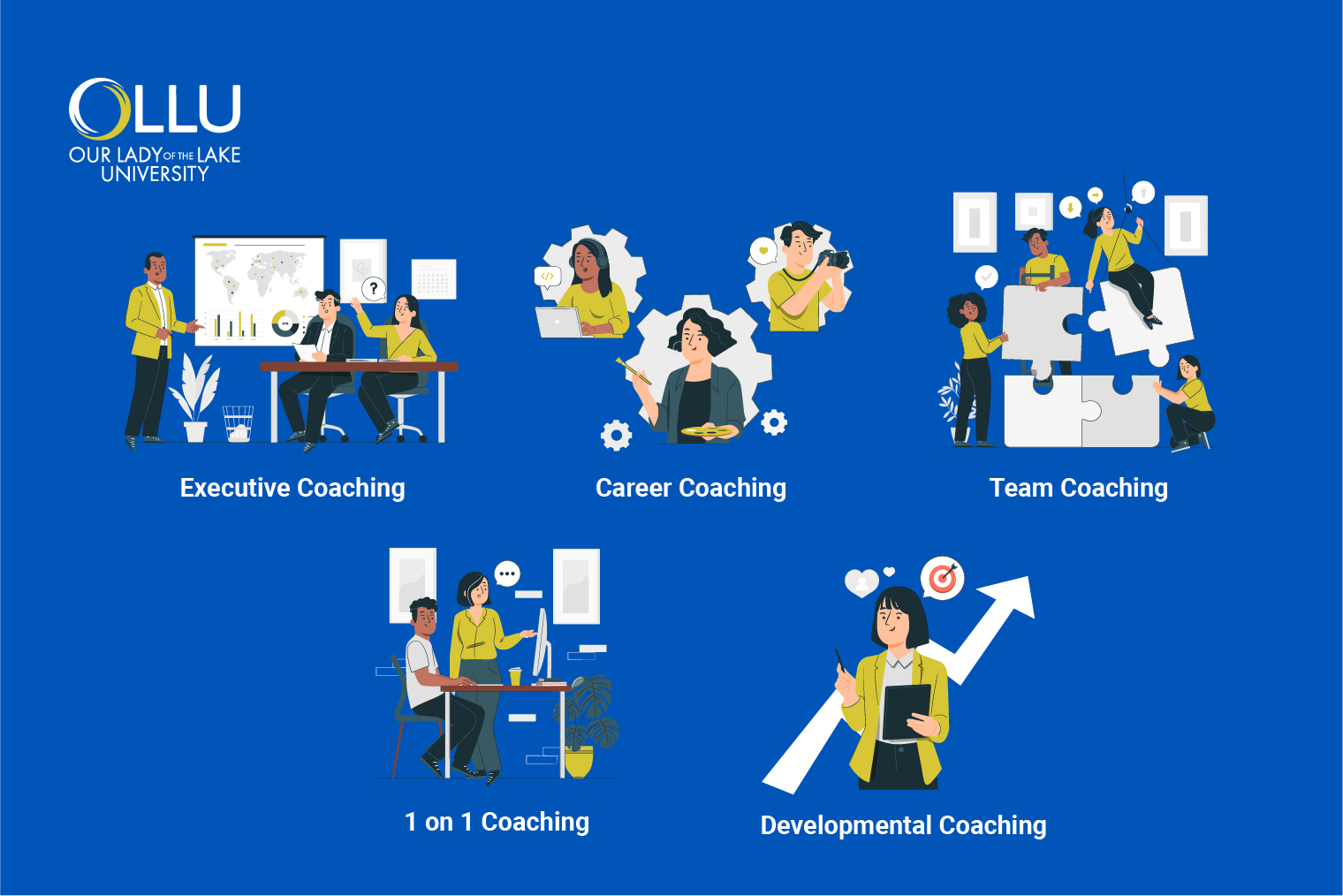What is a Leadership Coach?
Aug 28, 2024

Have you ever met someone with leadership potential who can't seem to climb up the ladder or play the right cards to advance in their career? Chances are they would benefit from the help of a leadership coach. But what exactly is a leadership coach?
A leadership coach is a professional who works with individuals and organizations to develop leadership skills. They guide clients on strategic thinking, decision-making, and personal growth, helping leaders achieve their full potential.
Do you want to become a successful and effective leadership coach? Read on as we explore the role of leadership coaches, the types of leadership coaching, and the steps you can take to kickstart your career in the field.
What is a Leadership Coach?
A leadership coach provides guidance, support, and feedback to individuals aiming to enhance their leadership skills. Their role involves working closely with leaders to identify strengths and areas for growth, set goals, and develop strategies to improve leadership capabilities.
They work with all types of clients, such as members of the C-suite, executives, first-time leaders moving into management roles, underrepresented demographics and groups, and employers with leadership potential in need of professional development.
Unlike life coaches, who focus solely on personal development and overall well-being, or career coaches, who focus on career planning and job search strategies, leadership coaches target leadership skills and organizational dynamics. Moreover, while life and career coaching often focus on guiding newcomers toward realizing their goals, leadership coaching often focuses on guiding individuals who are already leaders in their companies.
What Does a Leadership Coach Do?
Leadership coaches provide guidance, feedback, and strategies tailored to the client's needs. Through active listening, empathy, and constructive feedback, these professionals empower clients to unlock their true potential and positively impact those around them.
To perform these tasks, leadership coaches utilize the coaching process, which involves:
-
Initial Assessment: Leadership coaches evaluate the client's current skills, challenges, and goals through interviews, assessments, and feedback from others. They also utilize tools kike the Myers-Briggs Type Indicator, 360-degree feedback surveys, and evaluations of emotional intelligence.
-
Goal Setting: Leadership coaches work with clients to establish clear, actionable goals that align with the client's values and organizational objectives. To streamline this process, they utilize the SMART (specific, measurable, achievable, relevant, and time-bound) method.
-
Action planning: Leadership coaches and clients create a detailed plan outlining the steps, resources, and timelines to achieve the goals. This includes identifying potential obstacles and strategies to overcome them.
-
Follow-up: Leadership coaches conduct regular check-ins, track progress, adjust the plan as needed, and celebrate milestones. They provide ongoing support and feedback to ensure continued development and success.
Types of Leadership Coaching

Leadership coaching can take many forms and address the specific needs of clients. Let's explore the main types to help you determine which specialization best suits your niche.
Executive coaching
Executive coaching is one of the most common and widely understood types of leadership coaching. It's tailored for senior leaders and executives and aims to enhance leadership effectiveness and drive positive organizational outcomes.
As one of the most popular modes of leadership development, it assists leaders in overcoming obstacles, honing new and old skills, and starting healthy habits for development.
Career coaching
Career coaching focuses on assisting individuals in making informed decisions about their career trajectory. This coaching approach aims to enhance career growth, job satisfaction, and work-life balance. Moreover, they help individuals align their career path with their personal values and professional ambitions, boosting productivity and well-being.
Team coaching
As the name suggests, team coaching is designed for groups and teams. It aims to enhance team dynamics and performance by focusing on improving collaboration and communication and achieving collective goals. Team coaching also fosters engagement, team health, and success in a sustainable way.
During the teaching process, coaches help teams align around a common purpose, establish inspiring visions, create healthy team relationships with clearly defined roles, and make informed decisions in line with the team and organizational goals.
1 on 1 coaching
One-on-one coaching is an individualized and highly focused approach to helping individuals reach their professional and personal goals. The essence of one-on-one coaching revolves around addressing leadership challenges, skills enhancement, and personal growth.
Leadership coaches advise individuals, such as middle managers, on skills that need improvement or learning, provide situational advice, and act as a sounding board.
Developmental coaching
Developmental coaching recognizes that individuals evolve over time and focuses on long-term professional development. It doesn't only address specific issues or goals but also helps individuals understand and leverage their evolving mindsets, behaviors, and beliefs to achieve personal and professional success.
By emphasizing future readiness and personal growth, developmental coaching helps individuals prepare for advanced responsibilities and leadership opportunities, ensuring they're well-equipped for ever-changing career challenges.
How to Become a Leadership Coach?
To build a successful coaching career, you need a combination of education, experience, and certification. Let's explore each step to becoming a leadership coach.
1. Education and training
Although the industry doesn't define any requirements, you typically need a bachelor's degree at a minimum. Earning your bachelor's degree in business or psychology can help you gain the necessary knowledge and skills to navigate the field.
However, an advanced degree can open more job opportunities and a higher salary. Consider pursuing a master's degree in Organizational Leadership and gain the crucial skills to promote better decision-making and create engaging teams. If you want to learn more about leadership theories and practices and leadership beyond borders, including inter-organizational, intra-organizational, and global leadership, consider earning a PhD in Leadership Studies.
You can also pursue leadership training programs from the International Coaching Federation (ICF), the College of Executive Coaching, the Co-Active Training Institute, and the Institute of Executive Coaching and Leadership.
2. Gain certification & earn CCE
While not all employers and clients require certification, earning credentials as a leadership coach can help you demonstrate your skills and expertise. Popular leadership coaching certifications include Professional Certified Coach (PCC) and Master Certified Coach (MCC) by the ICF, Certified Professional Coach (CPC), and Advanced Certified Professional and Executive Coach (ACPEC) by the College of Executive Coaching.
After earning your ICF certification, you should also participate in Continuing Coach Education (CCE) to stay current in the field and renew your ICF credential. You can earn CCE units by completing supplemental and continuing coach education that is directly related to the ICF Core Competencies or education in skills that contribute to your professional development, including coaching tools or assessments.
3. Build experience
Gaining expertise in the profession is beneficial on your journey to becoming a leadership coach. You can start by gaining experience through pro bono work or internships. You can also work part-time in training institutions dealing with leadership coaching. This way, you understand what the profession is about and how it can help you guide others. Also, consider working as a career coach for a while to hone your abilities to coach others.
You can also benefit from networking and finding a mentor who can guide you through the process and share advice. These relationships can lead to new opportunities and insights and can be invaluable in developing your coaching style and business acumen.
4. Specialization
Although leadership coaching is a specialized form of coaching, there are other niches that you can choose from depending on your skills and knowledge. By developing expertise in a niche area of coaching, you can attract clients seeking specific guidance and establish yourself as an authority in that area.
Choosing the right niche begins with a reflection of your interests, strengths, and experiences. Next, you should understand the needs and challenges of your target clients through surveys, interviews, or online research. As part of target clients' research, you should also consider market trends, the growth potential of different coaching niches, and whether emerging trends align with your interests and skills.
Leadership Coach: Salary and Job Outlook
Like with any role, the compensation a leadership coach can expect to receive varies greatly, depending on factors like experience, industry, and job location. However, on average, a leadership coach can earn a base annual salary of $93,508.
The leadership coaching field is growing rapidly and with good reason. The demand is increasing as more organizations seek to develop their leaders' skills, create a more positive work environment, and improve overall morale. The Bureau of Labor Statistics projects a 6% employment growth, with about 35,400 openings each year for training and development specialists, which includes leadership coaches too.
The Bottom Line
Leadership coaching is a transformative process designed to enhance the effectiveness of individuals and teams through tailored coaching methods. This field also offers rewarding opportunities, including a promising salary and strong career prospects.
The impact of leadership coaching extends beyond personal growth; it drives organizational success and fosters a culture of excellence. If you're passionate about inspiring others and driving meaningful change, becoming a leadership coach could be your ideal career.
The journey to becoming one involves a combination of formal education, certification, and experience. Take the first step toward this exciting career and check out our MS in Organizational Leadership and PhD in Leadership Studies. Enroll today and take on the journey of helping others unlock their full potential.
Frequently Asked Questions:
What is the goal of leadership coaching?
The goal of leadership coaching is to enhance leadership skills, boost personal growth, and ultimately drive team and organizational success.
What do I need to be a leadership coach?
To become a leadership coach, you need a combination of formal education, ICF certification, CCE credits, experience, and specialization.
Who needs leadership coaching?
Anyone seeking to improve their leadership skills and effectiveness as a leader can benefit from a leadership coach, regardless of current position or experience. This includes leaders at all levels, such as executives, managers, team leaders, aspiring leaders, and leaders seeking personal growth.